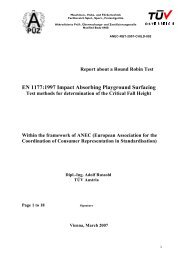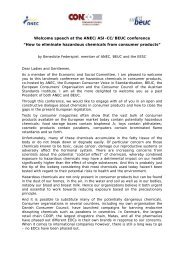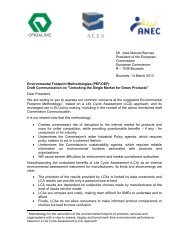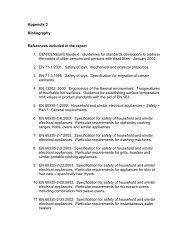Services Standards: Defining the Core Consumer Elements ... - ANEC
Services Standards: Defining the Core Consumer Elements ... - ANEC
Services Standards: Defining the Core Consumer Elements ... - ANEC
Create successful ePaper yourself
Turn your PDF publications into a flip-book with our unique Google optimized e-Paper software.
<strong>Services</strong> <strong>Standards</strong><br />
already existing national, European or international standards, codes,<br />
guidelines or recommendations, <strong>the</strong>se findings are not reflected in <strong>the</strong> adopted<br />
version of <strong>the</strong> standard. Technical standards are usually unrelated to <strong>the</strong>ir legal<br />
environment. That is why <strong>the</strong> world of standardisation appears to be separated<br />
from <strong>the</strong> legal world of binding or default regulation. The two worlds might coexist<br />
without too much overlapping if standardisation is limited to defining<br />
technical issues in <strong>the</strong> proper sense 423 . However, <strong>the</strong> more standardisation is<br />
overstepping <strong>the</strong>se boundaries – and it is <strong>the</strong> explicit policy of <strong>the</strong> European<br />
Commission that <strong>the</strong> <strong>Standards</strong> Bodies are moving this way – <strong>the</strong> more it is<br />
necessary, even indispensable, to indicate <strong>the</strong> legal environment in which <strong>the</strong><br />
standards have to be embedded.<br />
The here chosen approach of reviewing technical standards against <strong>the</strong> core<br />
consumer elements provides ample evidence for such an assessment. The first<br />
step into that direction has been <strong>the</strong> well-known New Approach which pushed<br />
<strong>the</strong> development of safety related standards. The Service Directive now<br />
delegates <strong>the</strong> broad issue of laying down standards on <strong>the</strong> quality of <strong>the</strong><br />
services into <strong>the</strong> hands of European and National <strong>Standards</strong> Bodies. This<br />
includes more than ever all issues around contract making.<br />
In short, standard-making has become less technical and much more political.<br />
Instead of weighing and measuring technical specifications, weighing and<br />
measuring of social behaviour is increasingly required 424 . This implies <strong>the</strong> need<br />
to link legal regulation to technical regulation and vice versa technical regulation<br />
to legal regulation. So far <strong>the</strong> communication remains one sided. Whilst more<br />
and more references to standardisation may be found in legal regulation, no<br />
such development can be reported from <strong>the</strong> standardisation business.<br />
5. Systematic versus piecemeal standardisation<br />
EC regulation and standardisation suffer from <strong>the</strong> same deficiencies. Most of<br />
<strong>the</strong> rules and standards are sector-specific, although quite a number of issues<br />
bear a horizontal character. In law, <strong>the</strong> vertical approach leads to<br />
inconsistencies and to frictions, at least if one undertakes <strong>the</strong> attempt to<br />
compare <strong>the</strong> vertical regulations. It is a well-known reaction that each vertical<br />
approach produces its own communication process. Just one example might<br />
highlight what is meant. Network services cover telecommunications, postal<br />
services, electricity and gas, railway services and public transport. Despite a<br />
423 The question of whe<strong>the</strong>r and to what extent technical standards in particular in new<br />
technologies may limit legislative leeway in <strong>the</strong> long run has been deliberately left aside.<br />
424 This aspect has been underlined by one of <strong>ANEC</strong>’s observers in technical committees.<br />
189
















